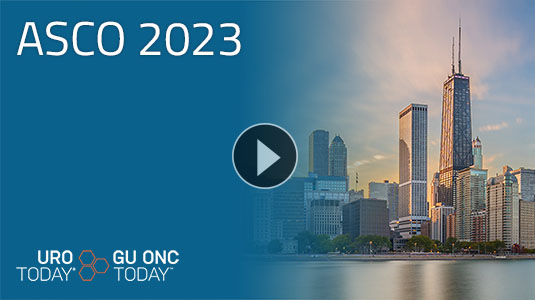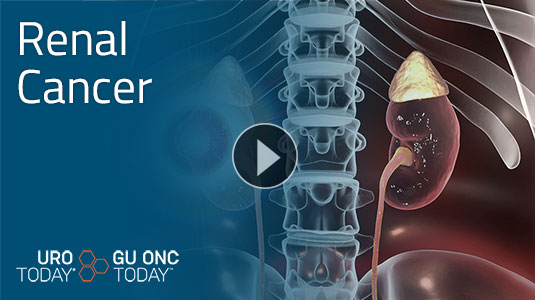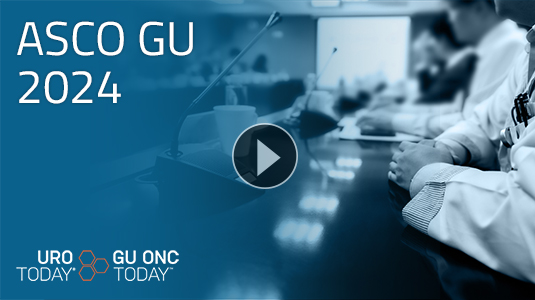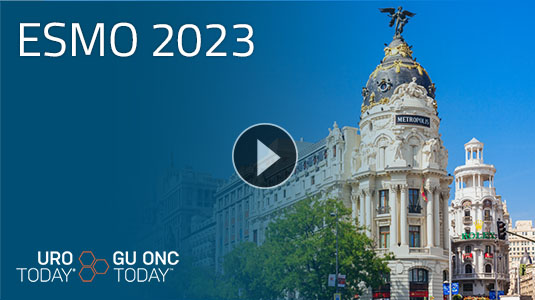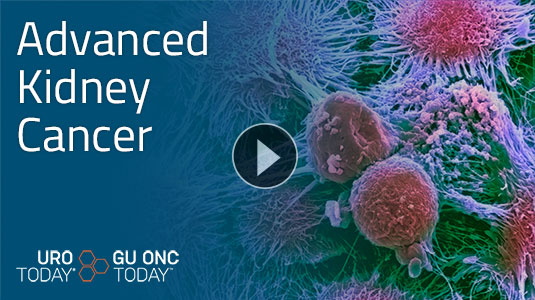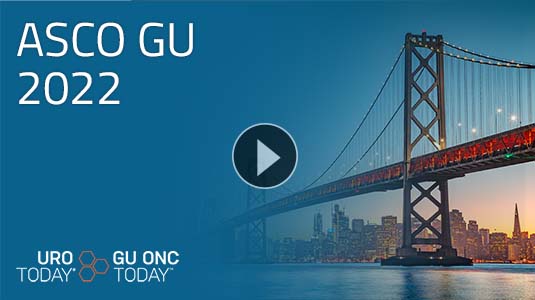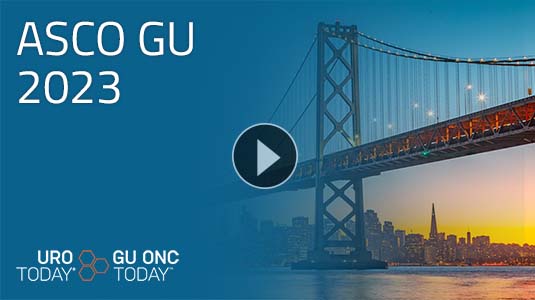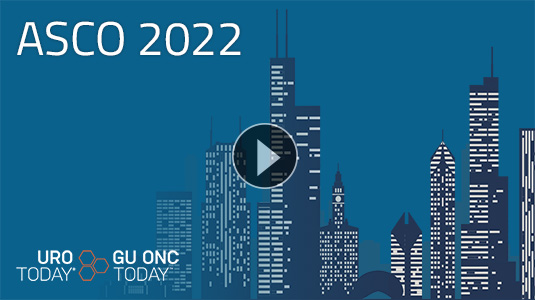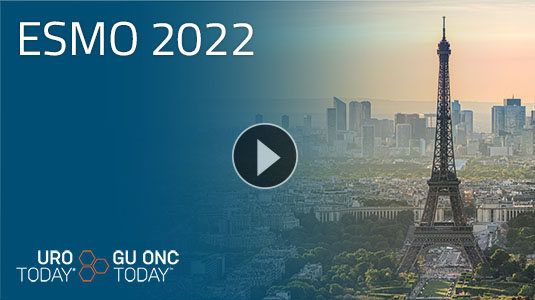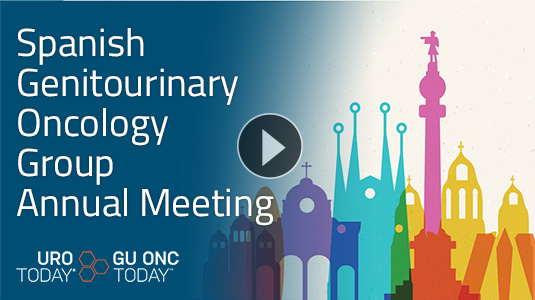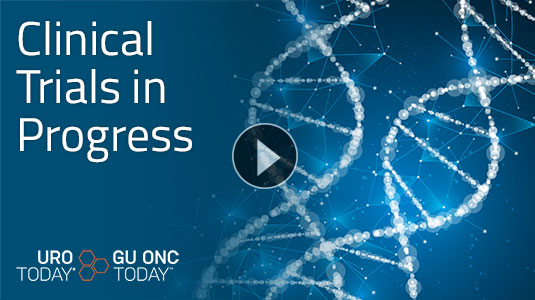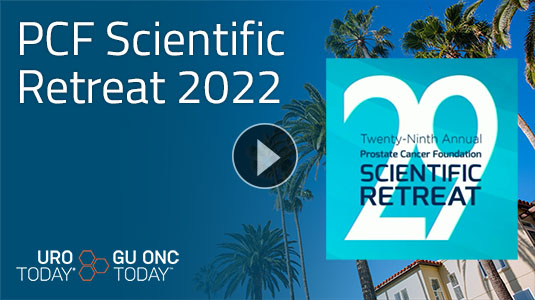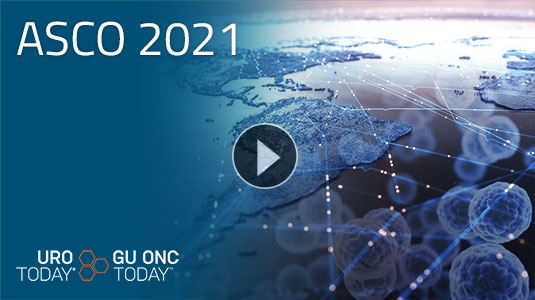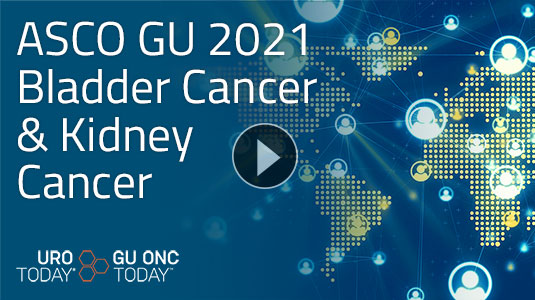SESAUA 2024: Safety and Efficacy of Surgery in Metastatic and Non-Metastatic RCC with Supradiaphragmatic Tumor Thrombus Involving Cardiac Procedures
Presented by Edouard Nicaise, MD
The 2024 SESAUA annual meeting featured a kidney cancer session and a presentation by Dr. Edouard Nicaise discussing the safety and efficacy of surgery in metastatic and non-metastatic renal cell carcinoma (RCC) with supradiaphragmatic tumor thrombus involving cardiac procedures. Invasion of the inferior vena cava (IVC) is a unique feature of RCC, and tumor thrombus extension into the supradiaphragmatic IVC carries high morbidity and mortality attributable to surgical complexity.
Read More
ASCO GU 2024: Belzutifan Versus Everolimus in Participants With Previously Treated Advanced Renal Cell Carcinoma: Patient-Reported Outcomes in the Phase 3 LITESPARK-005 Study
Presented by Thomas Powles, MBBS, MRCP, MD
Thomas Powles presented the patient-reported outcomes from the phase 3 LITESPARK-005 study of belzutifan versus everolimus in patients with previously treated advanced renal cell carcinoma (RCC).
Read More
ASCO GU 2024: Insights from CheckMate 67T and Patient-Reported Outcomes in LITESPARK-005 for Advanced RCC
Presented by Ulka N. Vaishampayan, MBBS
Ulka Vaishampayan delivered the discussant for the preceding two presentations: Subcutaneous nivolumab (NIVO SC) versus intravenous nivolumab in patients with previously treated advanced or metastatic clear cell renal cell carcinoma: Pharmacokinetics, efficacy, and safety results from CheckMate 67T and Belzutifan versus everolimus in participants with previously treated advanced renal cell carcinoma: Patient-reported outcomes in the phase 3 LITESPARK-005 study.
Read More
ASCO GU 2024: Subcutaneous Nivolumab Versus Intravenous Nivolumab in Patients With Previously Treated Advanced or Metastatic Clear Cell Renal Cell Carcinoma: Pharmacokinetics, Efficacy, and Safety Results From CheckMate 67T
Presented by Saby George, MD, FACP
Saby George presented the late-breaking pharmacokinetics, efficacy, and safety results from CheckMate 67T comparing subcutaneous and intravenous nivolumab in patients with previously treated advanced or metastatic clear cell renal cell carcinoma (RCC).
Read More
ASCO GU 2024: The Role of Radiation in Primary Tumor and Distant Sites in Managing Renal Cell Carcinoma
Presented by Sophia C. Kamran, MD
Sophia Kamran discussed the role of radiation therapy for the management of RCC primary tumors and distant metastatic sites. Dr. Kamran noted that the ‘historical teaching’ is that radiation is not effective for RCC in either the primary or metastatic setting, with radiation primarily reserved for palliative purposes. But in contemporary practice, is RCC radioresistant?
Read More
ASCO GU 2024: Overall Survival Results from the Phase 3 KEYNOTE-564 Study of Adjuvant Pembrolizumab vs Placebo for the Treatment of Clear Cell RCC
Presented by Toni K. Choueiri, MD
The 2024 GU ASCO annual meeting featured an oral abstract renal cell carcinoma session and a presentation by Dr. Toni Choueiri discussing overall survival results from the phase 3 KEYNOTE-564 study of adjuvant pembrolizumab versus placebo for the treatment of clear cell renal cell carcinoma.
Read More
ESMO 2023: Discussant: EV-302/KEYNOTE-A39 & CheckMate 901: Welcoming a New Standard of Care in the First-Line Treatment of Urothelial Carcinoma
Presented by Andrea B. Apolo, MD
Dr. Andrea Apolo delivered the discussant for the preceding two late-breaking oral abstract presentations: EV-302/KEYNOTE-A39: Open-Label, Randomized Phase 3 Study of Enfortumab Vedotin in Combination with Pembrolizumab (EV+P) Vs Chemotherapy (Chemo) in Previously Untreated Locally Advanced Metastatic Urothelial Carcinoma (la/mUC), Nivolumab plus gemcitabine-cisplatin versus gemcitabine-cisplatin alone for previously untreated unresectable or metastatic urothelial carcinoma: results from the phase 3 CheckMate 901 trial
Read More
ESMO 2023: LITESPARK-013 Phase 2- Safety and Efficacy of Two Doses of Belzutifan in Patients with Advanced Renal Cell Carcinoma (RCC)
Presented by Neeraj Agarwal, MD
During the 2023 ESMO annual congress, Dr. Neeraj Agarwal presented the results of the phase II LITESPARK-013 study that evaluated the safety and efficacy of two doses of belzutifan in patients with advanced renal cell carcinoma (RCC).
Read More
AUA 2023: Management of Metastatic Non-Clear Cell RCC
Presented by Brian Rini, MD, FASCO
Dr. Brian Rini kicked off the initial talk of the SUO session at the AUA 2023 Annual Meeting, focusing on the management of metastatic non-clear cell renal cell carcinoma (nccRCC). First, he focused on papillary renal cell carcinoma (RCC).
Read More
ESMO 2022: Phase 3 Study of Cabozantinib in Combination With Nivolumab and Ipilimumab in Previously Untreated Advanced Renal Cell Carcinoma of IMDC Intermediate or Poor Risk (COSMIC-313)
Presented by Toni K. Choueiri, MD
The Presidential Symposium III at the ESMO Annual Congress, Dr. Chouieri presented highly awaited results from the COSMIC-313 trial, examining the role of triplet therapy with cabozantinib, nivolumab and ipilimumab as first-line treatment in patients with advanced renal cell carcinoma (aRCC).
Read More
ESMO 2022: Updated Results From the CLEAR Trial and the Final Results of TITAN-RCC Discussion
Presented by Kate Young, MD
Following presentations from Dr. Camillo Porta discussing updated results from the CLEAR trial on outcomes of the combination of Lenvatinib and pembrolizumab as first-line therapy in advanced renal cell carcinoma (RCC) and from Dr. Grimm discussing a tailored approach using nivolumab either as monotherapy or in combination with ipilimumab in metastatic RCC, Dr. Young provided an invited discussion to contextualize these results in the Mini Oral session of the European Society for Medical Oncology (ESMO) Annual Congress focusing on non-prostate genitourinary cancers.
Read More
ESMO 2022: Efficacy of a Tailored Approach With Nivolumab and Nivolumab/ipilimumab as Immunotherapeutic Boost in Metastatic Renal Cell Carcinoma – Final Results of TITAN-RCC
Presented by Marc-Oliver Grimm, MD
At the ESMO Annual Congress focusing on non-prostate genitourinary cancers, Dr. Grimm presented the final results of the TITAN-RCC trial, assessing a tailored approach to systemic therapy in patients with metastatic renal cell carcinoma (mRCC).
Read More
ESMO 2022: Updated Efficacy of Lenvatinib + Pembrolizumab Vs Sunitinib in Patients With Advanced Renal Cell Carcinoma in the CLEAR Study
Presented by Camillo G. Porta, MD, Professor, Bari, Italy
In the Mini Oral session of the ESMO Annual Congress focusing on non-prostate genitourinary cancers, Dr. Porta provided an updated analysis of the CLEAR trial examining the role of the combination of lenvatinib and pembrolizumab, as compared to sunitinib, as first-line therapy in advanced renal cell carcinoma (aRCC).
Read More
ASCO 2022: Pembrolizumab + Axitinib Versus Sunitinib As First-Line Therapy for Advanced Clear Cell RCC: Analysis of Progression After First Subsequent Therapy in KEYNOTE-426
Presented by Thomas Powles, MD
The 2022 ASCO annual meeting featured a poster discussion session on kidney and bladder cancer, including a presentation by Dr. Tom Powles discussing an analysis of progression after first subsequent therapy in KEYNOTE-426, which tested pembrolizumab + axitinib versus sunitinib as first-line therapy for advanced clear cell RCC.
Read More
ASCO 2022: LITESPARK-004 (MK-6482-004) Phase 2 Study of Belzutifan, an Oral HIF-2α Inhibitor, for Von Hippel-Lindau Disease: Update With More Than Two Years of Follow-Up Data
Presented by Eric Jonasch, MD,
The 2022 ASCO annual meeting featured a session on kidney and bladder cancer, including a presentation by Dr. Eric Jonasch discussing updated results of the LITESPARK-004 phase 2 study of belzutifan, an oral hypoxia-inducible factor 2α inhibitor (HIF-2α), for von Hippel-Lindau (VHL) disease.
Read More
AUA 2022: Is Cytoreductive Nephrectomy Dead or Alive in 2022?
Presented by Daniel Shapiro, MD
The 2022 American Urological Association (AUA) Annual Meeting included the Society of Urologic Oncology (SUO) session and a presentation by Dr. Daniel Shapiro discussing the role of cytoreductive nephrectomy in 2022.
Read More
EIKCS 2022: ‘Real World’ Impact of Immune Checkpoint Inhibitors on Survival in Metastatic Renal Cell Carcinoma
Presented by Will Ince, FRCR, MRCP, MRCGP, MB BS
The 2022 International Kidney Cancer Symposium (IKCS) European Annual meeting included an oral abstract session and presentation by Dr. Will Ince discussing the real world impact of immune checkpoint inhibitors on survival in metastatic RCC.
Read More
EIKCS 2022: Debate: In Favor of Clinical Considerations and Challenges in Selecting Later-line Therapies
Presented by Laurence Albiges, MD, PhD,
In the sixth session of the 2022 International Kidney Cancer Symposium (IKCS): Europe meeting focusing on later-lines of systemic therapy in advanced kidney cancer, Drs. Camillo Porta and Laurence Albiges debated the approach to second-line therapy in metastatic renal cell carcinoma (mRCC).
Read More
EIKCS 2022: Debate: In Favor of Evidence-based Treatment in the 2nd and 3rd Line
Presented by Camillo Porta, MD
In the sixth session of the 2022 International Kidney Cancer Symposium (IKCS): Europe meeting focusing on later lines of systemic therapy in advanced kidney cancer, Drs. Camillo Porta and Laurence Albiges debated the approach to second-line therapy in metastatic renal cell carcinoma (mRCC). Dr. Porta presented first, emphasizing evidence-based second line treatment approaches.
Read More
EIKCS 2022: Debate: In Favor of IO/TKI
Presented by Lisa Pickering, MD, PhD
In the fifth session of the 2022 International Kidney Cancer Symposium (IKCS): Europe meeting focusing on first-line systemic therapy in advanced kidney cancer (metastatic renal cell carcinoma, mRCC), Dr. Pickering presented the first side of a debate regarding treatment selection, defending the approach of immune checkpoint inhibition combined with tyrosine kinase inhibitor (IO/TKI).
Read More
EIKCS 2022: Debate: In Favor of IO/IO
Presented by Aristotelis Bamias, MD, PhD
In the fifth session of the 2022 International Kidney Cancer Symposium (IKCS): Europe meeting focusing on first-line systemic therapy in advanced kidney cancer, Dr. Aristotelis Bamias presented the second side of the debate regarding treatment selection, defending the approach of dual immune checkpoint inhibition with nivolumab and ipilimumab.
Read More
EIKCS 2022: Nivolumab + Ipilimumab + Cabozantinib for Previously Untreated Advanced RCC: Results from a Discontinued Study Arm of CheckMate 9ER
Presented by Bernard Escudier, MD,
The 2022 International Kidney Cancer Symposium (IKCS) European Annual meeting included an oral abstract session and presentation by Dr. Bernard Escudier discussing nivolumab + ipilimumab + cabozantinib for previously untreated advanced renal cell carcinoma (RCC), which was a discontinued study arm in the phase 3 CheckMate 9ER trial.
Read More
ASCO GU 2022: Efficacy and Safety of Lenvatinib Plus Pembrolizumab Versus Sunitinibin the East Asian Subset of Patients With Advanced Renal Cell Carcinoma From the Phase 3 CLEAR Trial
Presented by Sun Young Rha MD, PhD
In Poster Session C on the third day of the American Society for Clinical Oncology (ASCO) Genitourinary Cancer Symposium 2022 focused on Renal Cell Cancer; Adrenal, Penile, Urethral, and Testicular Cancers. In this session, Dr. Rha presented subgroup analyses of efficacy and safety from the CLEAR trial of Lenvatinib and pembrolizumab among East Asian patients with advanced renal cell carcinoma (aRCC).
Read More
ASCO GU 2022: HRQoL in Previously Untreated Patients With Advanced Renal Cell Carcinoma: CheckMate 9ER Updated Results
Presented by David Cella, PhD
The 2022 GU ASCO Annual meeting included a renal cell carcinoma (RCC) session highlighting work from Dr. David Cella and investigators presenting results assessing HRQoL in previously untreated patients with advanced renal cell carcinoma in the CheckMate 9ER trial.
Read More
ASCO GU 2022: Efficacy, Safety, and Biomarker Analysis of Neoadjuvant Avelumab/Axitinib in Patients With Localized Renal Cell Carcinoma Who Are at High Risk of Relapse After Nephrectomy (NeoAvAx)
Presented by Axel Bex, MD, PhD
In an oral abstract Dr. Axel Bex presented results of the NeoAvAx study examining neoadjuvant avelumab and axitinib following nephrectomy for patients who are at high risk for recurrence.
Read More
ASCO GU 2022: Pembrolizumab As Post Nephrectomy Adjuvant Therapy for Patients With Renal Cell Carcinoma: Results From 30-Month Follow-Up of KEYNOTE-564
Presented by Toni K. Choueiri, MD
In an oral abstract Dr. Toni Choueiri presented 30-month follow-up from the KEYNOTE-564 trial of post-nephrectomy adjuvant pembrolizumab in patients with renal cell carcinoma (RCC).
Read More
ASCO GU 2022: PIVOT IO 011: A Phase 1/2 Study of Bempegaldesleukin Plus Nivolumab and TKI Versus Nivolumab and TKI Alone in Patients With Previously Untreated Advanced or mRCC
Presented by Martin H Voss, MD
Dr. Martin Voss presented the PIVOT IO 011 study, a phase 1/2 study evaluating of bempegaldesleukin plus nivolumab and TKI versus nivolumab and TKI alone in patients with previously untreated advanced or metastatic RCC.
Read More
ASCO GU 2022: TiNivo-2: Comparing Tivozanib in Combination With Nivolumab to Tivozanib Monotherapy in Subjects With Renal Cell Carcinoma Who Have Progressed Following One or Two Lines of Therapy Where One Line Has an Immune Checkpoint Inhibitor
Presented by Toni K. Choueiri MD
Dr. Toni Choueiri presented the rationale and design of the TiNivo-2 trial, examining tivozanib with or without nivolumab in patients with renal cell carcinoma (RCC) who have progressed following one or two lines of therapy, one of which was an immune checkpoint inhibitor.
Read More
ASCO GU 2022: Real-World Assessment of Changing Treatment Patterns and Sequence for Patients With Metastatic RCC in the First-Line Setting
Presented by Neil Shah, MBBS
Dr. Neil Shah and colleagues presented results of a real-world assessment of changing treatment patterns and sequence for patients with metastatic renal cell carcinoma in the first-line setting.
Read More
SUO 2021: Adjuvant Therapy for Kidney Cancer: Are We There Yet?
Presented by Robert Dreicer, MD, MS, MACP, FASCO
The SUO 2021 annual meeting in Orlando, FL hosted a second State of the Art Lecture by Dr. Robert Dreicer, MD, MS, MACP, FASCO discussing adjuvant therapy for kidney cancer.
Read More
SIU 2021: Nephrectomy as Part of the Sequencing Options in Metastatic Renal Cell Carcinoma with Primary in Place
Presented by Kevin Lu, MD
The SIU 2021 annual meeting included a master class on advanced kidney cancer with a presentation by Dr. Kevin Lu discussing nephrectomy as part of the sequencing options in metastatic renal cell carcinoma (RCC) with the primary in place.
Read More
IKCS 2021: Gene Expression Profiling (GEP) of Non-Clear Cell Renal Cell Carcinoma
Presented by Pedro C. Barata, MD, MSc
At the 2021 International Kidney Cancer Symposium (IKCS): North America meeting, Dr. Barata presented their work examining gene expression profiling (GEP) in non-clear cell renal cell carcinoma. They employed DNA/RNA next-generation sequencing of tumor samples from the Caris Life Sciences lab. They defined molecular subgroups according to the criteria set out by Motzer et al. and examined 7 clusters.
Read More
IKCS 2021: Systemic Therapy for Non-Clear Cell: Recent and Future Studies
Presented by Bradley McGregor, MD
The International Kidney Cancer Symposium 2021 annual hybrid meeting included a non-clear cell renal cell carcinoma (RCC) session and a presentation by Dr. Bradley McGregor discussing recent and future studies of systemic therapy for non-clear cell RCC.
Read More
IKCS 2021: Future of Adjuvant Therapy in RCC
Presented by Toni K. Choueiri, MD
In a session of the 2021 International Kidney Cancer Symposium (IKCS): North America meeting focused on the role and effects of adjuvant immunotherapy in renal cell carcinoma (RCC) on subsequent first-line therapy, Dr. Choueiri provided an overview of his perspective of the future of adjuvant therapy in this disease space.
Read More
ESMO 2021: Pembrolizumab vs Placebo As Adjuvant Therapy for Patients With Renal Cell Carcinoma: Patient-Reported Outcomes in KEYNOTE-564
Presented by Toni K. Choueiri, MD
In this presentation, Dr. Toni Choueiri discussed patient-reported outcomes (PROs) from KEYNOTE-564, a randomized phase 3 study of adjuvant Pembrolizumab versus placebo in patients with renal cell carcinoma (RCC). Read More
ESMO 2021: Nivolumab in Combination With Alternatively Scheduled Ipilimumab in First-Line Treatment of Patients With Advanced RCC: A Randomized Phase II Trial (PRISM)
Presented by Naveen S. Vasudev, PhD, MRCP, MBChB, BMSc (Hons)
The ESMO 2021 annual meeting’s non-prostate cancer proffered paper session included a presentation by Dr. Naveen Vasudev discussing results of the phase II PRISM trial assessing nivolumab combination with alternatively scheduled ipilimumab in first-line treatment of advanced renal cell carcinoma (RCC).
Read More
ESMO 2021: Cabozantinib-Nivolumab Versus Nivolumab-Cabozantinib in Patients With Metastatic Clear Cell RCC Following One Prior VEGFR TKI: The CABIR Multicenter Matching-Adjusted Study
Presented by Yann Vano, MD
The ESMO 2021 virtual annual meeting’s non-prostate cancer session included a presentation by Dr. Yann Vano discussing the CABIR study of patients receiving cabozantinib-nivolumab versus nivolumab-cabozantinib after receiving a prior VEGFR TKI for metastatic clear cell RCC. Nivolumab and cabozantinib are two approved agents after a prior TKI in metastatic RCC patients. Read More
ESMO 2021: Randomized, Open-Label, 3-Arm Phase 3 Study Comparing MK-1308A + Lenvatinib and Pembrolizumab + Belzutifan + Lenvatinib versus Pembrolizumab + Lenvatinib as First-line Treatment for Advanced Clear Cell RCC
Presented by Brina Rini, MD
The ESMO 2021 annual meeting’s non-prostate cancer session included a presentation by Dr. Brian Rini discussing a new 3-arm phase 3 trial concept and design, which will randomize patients with advanced clear cell RCC in the first-line setting to either pembrolizumab + belzutifan + lenvatinib versus MK-1308A + lenvatinib versus pembrolizumab + lenvatinib. Read More
ESMO 2021: Conditional Survival and 5-Year Follow-Up in CheckMate 214: First-Line Nivolumab + Ipilimumab Versus Sunitinib in Advanced RCC
Presented by Robert J. Motzer, MD
The ESMO 2021 virtual annual meeting’s non-prostate cancer session included a presentation by Dr. Robert Motzer discussing updated data from the CheckMate 214 trial with 5-years of follow-up.
Read More
ESMO 2021: Phase 3 CLEAR Trial in Advanced Renal Cell Carcinoma: Outcomes in Subgroups and Toxicity Update
Presented by Toni K. Choueiri, MD
The ESMO 2021 annual meeting’s non-prostate cancer session included a presentation by Dr. Toni Choueiri discussing outcomes of subgroup analyses and a toxicity update among patients in the phase 3 CLEAR trial for advanced renal cell carcinoma (RCC).
Read More
ASCO 2021: Pembrolizumab Versus Placebo As Post-Nephrectomy Adjuvant Therapy for Patients With Renal Cell Carcinoma: Randomized, Double-Blind, Phase III Keynote-564 Study
Presented by Toni K. Choueiri. MD
In this presentation, Dr. Toni Choueiri presented results from KEYNOTE-564, a study of adjuvant pembrolizumab administered for one year after complete surgical resection of clear cell RCC. The eligibility and study design are shown below. The primary endpoint was disease-free survival by investigator assessment.
Read More
ASCO 2021: A Quantum Leap in Cancer Adjuvant Immunotherapy - KEYNOTE 564 Phase 3 Trial - Discussion
Presented by Rana R. McKay, MD
The much anticipated ASCO 2021 annual program plenary session included a discussant presentation by Dr. Rana McKay providing her expertise on the recently presented KEYNOTE 564 phase 3 trial with her talk entitled “A Quantum Leap in Cancer Adjuvant Immunotherapy”.
Read More
Systemic Therapy For Kidney Cancer: Challenges and Emerging Strategies
Presented by Ramaprasad Srinivasan, M.D., Ph.D
Building on the presentations from Dr. Linehan regarding the genetic causes of renal cell carcinoma (RCC) and from Dr. McDermott regarding current and future direction for immunotherapy in RCC, Dr. Srinivasan presented on challenges and emerging strategies for systemic therapy in kidney cancer.
Read More
EIKCS 2021: Kidney Cancer as a Model for a Curable Neoplasm
Presented by David F. McDermott, MD
The European International Kidney Cancer Symposium 2021 virtual meeting’s keynote lecture was provided by Dr. David McDermott discussing kidney cancer as a model for a curable neoplasm.
Read More
EIKCS 2021: Designing Biomarker-Driven Trials: Opportunities and Challenges
Presented by Yann-Alexandre Vano, MD
Dr. Vano discussed biomarker-driven trials. He first argued for the rationale of biomarker-driven trials based on the rationale that metastatic kidney cancer represents an incurable disease and current therapies have significant toxicity. He further emphasized that, based on drug development over the past two decades, there are many treatment options in mRCC that improve survival.
Read More
EIKCS 2021: Tissue-Based Biomarkers for Potential Clinical Adoption in Renal Cancer
Presented by Thomas Powles, MBBS, MRCP, MD
The European International Kidney Cancer Symposium 2021 Virtual Meeting included a systemic therapy session and a presentation by Dr. Thomas Powles discussing tissue-based biomarkers for potential clinical adoption in renal cancer.
Read More
EIKCS 2021: Modern Therapeutic Approaches in Second-Line and Later Therapies
Presented by Camillo Porta, MD
To help guide treatment choices for those who progress on first-line therapy, Dr. Camillo Porta discussed modern therapeutic approaches in second-line and later therapies in a presentation at the European International Kidney Cancer 2021 Virtual Annual Meeting.
Read More
ASCO GU 2021: The CLEAR Study of Lenvatinib Plus Pembrolizumab or Everolimus vs Sunitinib and the SWOG 1500 Trial of Sunitinib, Cabozantinib, Crizotinib, and Savolitinib in Advanced Kidney Cancer: Discussion
Presented by Stephanie A. Berg, DO
Following presentations by Dr. Robert Motzer discussing results of the CLEAR study of lenvatinib plus pembrolizumab or everolimus versus sunitinib in first-line treatment of advanced renal cell carcinoma and by Dr. Sumanta Pal looking at the SWOG 1500 trial of sunitinib, cabozantinib, crizotinib, and savolitinib in patients with metastatic papillary renal cell carcinoma.
Read More
ASCO GU 2021: TIVO-3: Tivozanib in Patients with Advanced Renal Cell Carcinoma Who Have Progressed After Treatment with Axitinib
Presented by Brian I. Rini, MD
The activity of tivozanib after axitinib has not been previously defined, and as such the activity of tivozanib after prior therapy types including axitinib is of clinical relevance. At the 2021 ASCO GU, Dr. Brian Rini and colleagues presented results of the TIVO-3 trial testing tivozanib in patients with advanced RCC who had progressed after prior axitinib treatment.
Read More
ASCO GU 2021: Patient-Reported Outcomes Of Patients With Advanced Renal Cell Carcinoma Treated With First-Line Nivolumab Plus Cabozantinib Versus Sunitinib: The Checkmate 9ER Trial
Presented by David Cella, PhD
The treatment landscape for first-line therapy among patients with metastatic renal cell carcinoma (mRCC) has changed dramatically over the past 2 years. In 2018, publication of the CheckMate214 data demonstrated a survival benefit for patients treated with nivolumab and ipilimumab compared with sunitinib in intermediate and poor-risk mRCC, ushering in the immunotherapy era for mRCC.
Read More
ASCO GU 2021: Final Results From a Phase I Trial and Expansion Cohorts of Cabozantinib and Nivolumab Alone or With Ipilimumab For Metastatic Genitourinary Tumors
Presented by Andrea B. Apolo, MD
Cabozantinib, nivolumab, and ipilimumab have been increasingly utilized for a number of genitourinary malignancies, most prominently in renal cell carcinoma. In a dose-escalation study, combinations of cabozantinib and nivolumab (CaboNivo) and cabozantinib, nivolumab, and ipilimumab (CaboNivoIpi) demonstrated promising efficacy and safety in a dose-escalation phase I study.
Read More
SUO 2020: Advanced Kidney Cancer Update – “A Glimpse into the Future"
Presented by Toni Choueiri, MD, MS
In this state-of-the-art presentation, Dr. Toni Choueiri gave an overview of the management of advanced kidney cancer. Several years ago, before the era of immunotherapy, when vascular endothelial growth factor (VEGF) receptor inhibitors were compared and used to treated advanced kidney cancer patients, the median overall survival was only 13 months.
Read More
ESMO Virtual Congress 2020: Results From the Phase 2 BIOmarker Driven Trial with Nivolumab and Ipilimumab or VEGFR TKI in Naïve Metastatic Kidney Cancer: the BIONIKK Trial
Presented by Yann-Alexandre Vano, MD, PhD
Sunitinib was standard first line treatment for metastatic clear cell renal cell carcinoma (mccRCC) for many years until multiple clinical trials showed superior efficacy of various treatment combinations including nivolumab and ipilimumab in International Metastatic RCC Database Consortium (IMDC) intermediate or poor-risk disease.
Read More
ESMO 2019: Adjuvant Sorafenib for Renal Cell Carcinoma at Intermediate or High Risk of Relapse, Results from the SORCE Trial
Presented by Tim Q. Eisen, PhD, MB, BChir
Barcelona, Spain (UroToday.com) Four large, randomized Phase 3 clinical trials (S-TRAC, ASSURE, PROTECT, and ATLAS) evaluated adjuvant VEGF tyrosine kinase inhibitors in patients with resected renal cell carcinoma (RCC).
Read More
EAU 2019: Post-Nephrectomy Adjuvant Therapy for Localized Renal Cell Carcinoma: CheckMate 914 Study of Nivolumab + Ipilimumab in Patients at High Risk of Relapse
Presented by Axel Bex, MD, PhD
Barcelona, Spain (UroToday.com) The current standard for advanced localized renal cell carcinoma (RCC) is nephrectomy. Unfortunately, for better or worse, the series of adjuvant therapy
Read More
EAU 2019: The Challenging Landscape in Advanced Renal Cell Cancer Management
Presented by Marc-Oliver Grimm
Barcelona, Spain (UroToday.com) Dr. Marc-Oliver Grimm provided an overview of the many changes in the landscape for advanced renal cell carcinoma at the urogenital cancer treatment at a glance session. He started by highlight that the guidelines for advanced kidney cancer have been revamped recently
Read More
ESMO 2018: Safety and Tolerability of Atezolizumab plus Bevacizumab vs Sunitinib in Untreated Metastatic Renal Cell Carcinoma: IMmotion 150 and IMmotion 151
Presented by Cristina Suarez, MD
Munich, Germany (UroToday.com) IMmotion 150 (Phase II) compared the efficacy of atezolizumab (atezo) plus bevacizumab (bev) with atezolizumab alone and sunitinib alone
Read More



